雅思写作A类考题回顾朗阁官方20150723
雅思阅读考题回顾朗阁官方20150723
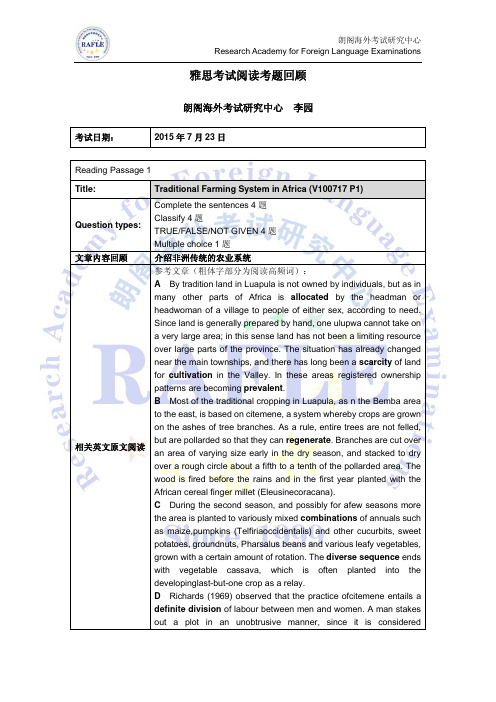
雅思考试阅读考题回顾朗阁海外考试研究中心李园考试日期: 2015年7月23日Reading Passage 1Title: Traditional Farming System in Africa (V100717 P1)Question types: Complete the sentences 4题Classify 4题TRUE/FALSE/NOT GIVEN 4题Multiple choice 1题文章内容回顾介绍非洲传统的农业系统相关英文原文阅读参考文章(粗体字部分为阅读高频词):A By tradition land in Luapula is not owned by individuals, but as in many other parts of Africa is allocated by the headman or headwoman of a village to people of either sex, according to need. Since land is generally prepared by hand, one ulupwa cannot take on a very large area; in this sense land has not been a limiting resource over large parts of the province. The situation has already changed near the main townships, and there has long been a scarcity of land for cultivation in the Valley. In these areas registered ownership patterns are becoming prevalent.B Most of the traditional cropping in Luapula, as n the Bemba area to the east, is based on citemene, a system whereby crops are grown on the ashes of tree branches. As a rule, entire trees are not felled, but are pollarded so that they can regenerate. Branches are cut over an area of varying size early in the dry season, and stacked to dry over a rough circle about a fifth to a tenth of the pollarded area. The wood is fired before the rains and in the first year planted with the African cereal finger millet (Eleusinecoracana).C During the second season, and possibly for afew seasons more the area is planted to variously mixed combinations of annuals such as maize,pumpkins (Telfiriaoccidentalis) and other cucurbits, sweet potatoes, groundnuts, Pharsalus beans and various leafy vegetables, grown with a certain amount of rotation. The diverse sequence ends with vegetable cassava, which is often planted into the developinglast-but-one crop as a relay.D Richards (1969) observed that the practice ofcitemene entails a definite division of labour between men and women. A man stakes out a plot in an unobtrusive manner, since it is consideredprovocative towards one’s neighbours to mark boundaries in an explicit way. The dangerous work of felling branches is the men’s province, and involves much pride. Branches are stacked by the women, and fired by the men. Formerly women and men cooperated in the planting work, but the harvesting was always done bathe women. At the beginning of the cycle little weeding is necessary, since the firing of the branches effectively destroys weeds. As the cycle progresses weeds increase and nutrients eventually become depleted to a point where further effort with annual crops is judged to be not worthwhile: at this point the cassava is planted, since it can produce a crop on nearly exhausted soil. Thereafter the plot is abandoned, and a new area pollarded for the next citemene cycle.E When forest is not available - this is increasingly the case nowadays - various ridging systems (ibala) are built on small areas, to be planted with combinations of maize, beans, groundnuts and sweet potatoes, usually relayed with cassava. These plots are usually tended by women, and provide subsistence. Where their roots have year-round access to water tables mango, guava and oil-palm trees often grow around houses, forming a traditional agroforestry system. In season some of the fruit is sold by the road side or in local marketsF The margins of dambos are sometimes planted to local varieties of rice during the rainy season, and areas adjacent to vegetables irrigated with water from the dambo during the dry season. The extent of cultivation is very limited, no doubt because the growing of crops under dambo conditions calls for a great deal of skill. Near towns some of the vegetable produce is sold in local markets.G Fishing has long provided a much needed protein supplement to the diet of Luapulans, as well as being the one substantial source of cash. Much fish is dried for sale to areas away from the main waterways. The Mweru and Bangweulu Lake Basins are the main areas of year-round fishing, but the Luapula River is also exploited during the latter part of the dry season. Several previously abundant and desirable species, such as the Luapula salmon or mpumbu (Labeoaltivelis) and pale (Saro the rodonmachochir) have all but disappeared from Lake Mweru, apparently due to mismanagement.H Fishing has always been a far more remunerative activity in Luapula that crop husbandry. A fisherman may earn more in a week than a bean or maize grower in a whole season. I sometimes heard claims that the relatively high earnings to be obtained from fishing induced an ‘easy come, easy go’ outlook among Luapulan men. On the other hand, someone who secures good but erratic earnings may feel that their investment in an economically productive activity is not worthwhile because Luapulans fail to cooperate well in suchactivities. Besides, a fisherman with spare cash will find little in the way of working equipment to spend his money on. Better spend one’s money in the bars and have a good time!I Only small numbers of cattle or oxen are keptin the province owing to the prevalence of the tsetse fly. For the few herds, the dambos provide subsistence grazing during the dry season. The absence of animal draft power greatly limits peoples’ ability to plough and cultivate land: a married couple can rarely manage to prepare by hand-hoeing. Most people keep freely roaming chickens and goats. These act as a reserve for bartering, but may also be occasionally slaughtered for ceremonies or for entertaining important visitors. These animals are not a regular part of most peoples’ diet.J Citemene has been an ingenious system for providing people with seasonal production of high quality cereals and vegetables in regions of acid, heavily leached soils. Nutritionally, the most serious deficiency was that of protein. This could at times be alleviated when fish was available, provided that cultivators lived near the Valley and could find the means of bartering for dried fish. The citemene/fishing system was well adapted to the ecology of the miombo regions and sustainable for long periods, but only as long as human population densities stayed at low levels. Although population densities are still much lower than in several countries of South-East Asia, neither the fisheries nor the forests and woodlands of Luapula are capable, with unmodified traditional practices, of supporting the people in a sustainable manner.Overall, people must learn to intensify and diversify their productive systems while yet ensuring that these systems will remain productive in the future, when even more people will need food. Increasing overall production of food, though a vast challenge in itself, will not be enough, however. At the same time storage and distribution systems must allow everyone access to at least a moderate share of the total.题型难度分析Questions 1-4Complete the sentences below with words taken from Reading Passage 1. Choose NO MORETHAN TWO WORDS from the passage for each answer.1. In Luapula land allocation is in accordance with need.2. The citemene system provides the land with (the) ashes where crops are planted.3. During the second season, the last planted crop is (vegetable) cassava.4. Under suitable conditions, fruit trees are planted near houses. Questions 5-8Classify the following items with the correct description.Write your answers in boxes 5-8 on your answer sheet.A. fishB. oxenC. goats5. be used in some unusual occasions, such as celebrations. C6. cannot thrive for being affected by the pests. B7. be the largest part of creating profit. A8. be sold beyond the local area. AQuestions 9-12Do the following statements agree with the information given in Reading Passage 1? WriteTRUE if the statement agrees with the informationFALSE if the statement contradicts with the informationNOT GIVEN if there is no information on this9. People rarely use animals to cultivate land. TRUE10. When it is a busy time, children usually took part in the labor force. NOTGIVEN11. The local residents eat goats on a regular time. FALSE12. Though citemene has been a sophisticated system, it could not provide enough protein. TRUEQuestion 13Choose the correct letter, A, B, C or D.What is the writer’s opinion about the traditional ways of practices? BA. They can supply the nutrition that people need.B. They are not capable of providing adequate support to the population.C. They are productive systems that need no more improving.D. They will be easily modified in the future第一篇的题型涉及较多,填空题+classify+判断+主旨单选。
雅思写作考题回顾
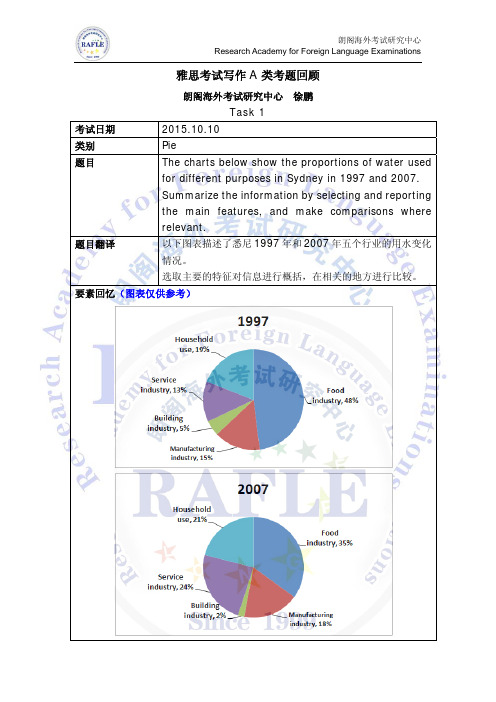
雅思考试写作A类考题回顾朗阁海外考试研究中心徐鹏Task 1考试日期2015.10.10类别Pie题目The charts below show the proportions of water used for different purposes in Sydney in 1997 and 2007.Summarize the information by selecting and reportingthe main features, and make comparisons whererelevant.题目翻译以下图表描述了悉尼1997年和2007年五个行业的用水变化情况。
选取主要的特征对信息进行概括,在相关的地方进行比较。
要素回忆(图表仅供参考)写作指导 1. 时态都是过去时2. 注意中间段分两段3. 注意要写10年间用水量在变化4. 横向比较不同行业用水量的对比重点表达式 1. water use = water consumption2. similarly, like, by contrast, on the contrary3. showed a rise / fall4. xxx was the largest / least5. xxx was much lower / larger than xxx题目评价难度中等推荐练习2015.08.13和08.29小作文近期考试趋势下一场考试动态line和table考察的可能性较高Task 2考试日期2015.10.10类别政府民生题目Some people think governments should focus onreducing environmental pollution and housingproblems to help people prevent illness and disease.To what extent do you agree or disagree?题目翻译一些人认为为了帮助人们预防疾病,政府应该将注意力集中于减少环境污染和解决住房问题。
8月13日雅思写作(A类)考题回顾
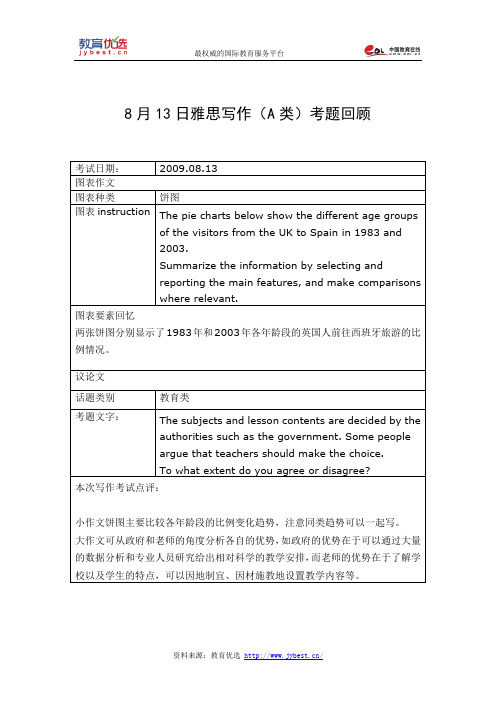
最权威的国际教育服务平台
资料来源:教育优选 /
8月13日雅思写作(A 类)考题回顾
考试日期: 2009.08.13
图表作文
图表种类 饼图
图表instruction The pie charts below show the different age groups
of the visitors from the UK to Spain in 1983 and
2003.
Summarize the information by selecting and
reporting the main features, and make comparisons
where relevant.
图表要素回忆
两张饼图分别显示了1983年和2003年各年龄段的英国人前往西班牙旅游的比例情况。
议论文
话题类别
教育类 考题文字: The subjects and lesson contents are decided by the
authorities such as the government. Some people
argue that teachers should make the choice.
To what extent do you agree or disagree?
本次写作考试点评:
小作文饼图主要比较各年龄段的比例变化趋势,注意同类趋势可以一起写。
大作文可从政府和老师的角度分析各自的优势,如政府的优势在于可以通过大量的数据分析和专业人员研究给出相对科学的教学安排,而老师的优势在于了解学校以及学生的特点,可以因地制宜、因材施教地设置教学内容等。
雅思A类写作题目完整版含图吐血整理

小作文:关于一年级新生对不同学科不同内容的满意度(%)
course satisfaction- percentage of first-year
students rating xxx as "very good"/satisfaction
大作文:Some people think that the age limit for driving should be increased in order to make driving safer. To what extent do you agree or disagree?
2/7/2015
小作文:The table and chart show the time spent at leisure and household activities in 2008.
大作文:Many museums and historical sites are mainly visited by tourists, not local people. Why? What can be done to attract local people?
3/12/2015
小作文:
大作文:Some people think that it is more important to plant more trees in open area which in towns and cities than build more housing. To what extend do agree or disagree?
2/28/2015
小作文:
大作文:Some students take one year off between finishing school and going to university, in order to travel or to work. Do you thinkadvantages outweigh disadvantages?
雅思听力考题回顾朗阁官方20150723
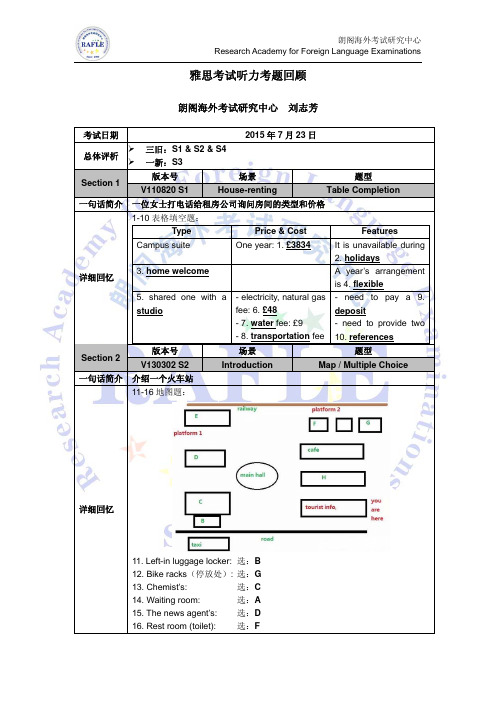
雅思考试听力考题回顾朗阁海外考试研究中心 刘志芳考试日期 2015年7月23日 总体评析 三旧:S1 & S2 & S4 一新:S3Section 1版本号 场景 题型V110820 S1 House-rentingTable Completion一句话简介 一位女士打电话给租房公司询问房间的类型和价格详细回忆1-10表格填空题:TypePrice & Cost FeaturesCampus suite One year: 1. £3834 It is unavailable during 2. holidays3. home welcomeA year’s arrangement is 4. flexible5. shared one with a studio- electricity, natural gas fee: 6. £48- 7. water fee: £9- 8. transportation fee - need to pay a 9. deposit- need to provide two 10. referencesSection 2版本号 场景 题型V130302 S2 IntroductionMap / Multiple Choice一句话简介 介绍一个火车站详细回忆11-16地图题:11. Left-in luggage locker: 选:B 12. Bike racks (停放处): 选:G 13. Chemist’s: 选:C 14. Waiting room: 选:A 15. The news agent’s: 选:D 16. Rest room (toilet): 选:F17-20单选题:17. Where could you see the exhibition? 选:AA. libraryB. college18. 你可以到商店买些什么带回去?选:AA. special local foodB. clothingC. travel souvenirs/gift for friends19. What will the old cinema be converted to? 选:A. resident block 住宅区The old cinema cannot compete against a new theatre in a shopping center, so the premise owner plans to make it an accommodation block there instead.20. Who is the status behind the train station? 选:AA. a politicianB. an engineerSection 3 版本号场景题型New Academy Multiple Choice / Flow chart一句话简介两个学习考古课程的同学讨论一次野外考察详细回忆21-25单选题:21. How did they feel before attending the activities? 选:CA. Lack of motivationB. EnthusiasticC. Confused22. After attending the activities and having some discovery, what are they most surprised at? 选:BB. Be careful about the recordC. Photos are important23. What did the woman find? 选:AA. Fabric (cloth is mentioned in the script)B. PotC. Jewelry24. What did they say about the people they studied? 选:CA. Various food C. Not as tall as people told25. What did they say about the people they worked with? 选:BA. From different countriesB. Work hardC. Young and enthusiastic 26-30 流程图配对,Excavating的流程:A. Taking soil samplesB. Make a comprehensive planC. Save for future researchD. Labeling themE. Looking for toolsF. Filling in recording sheet26. E. Looking for tools27. F. Filling in recording sheet (report)28. B. Make a comprehensive plan (in great detail)29. A. Taking soil samples30. D. Labeling themSection 4版本号场景题型V131121 S4=V110416 S4Obesity Completion一句话简介肥胖饮食调查详细回忆31-40填空题:Survey:31. Which group takes in the most fat: teenagers32. do research concerning: investigated by different age, race and income,whether born overseas33. Surveys have been conducted in mobile XX.34. similar methods / background35. adults live with children “drink more milk”Results:36. parents have no timeLimitation of the research:37. number of children38. the research didn’t consider the authority and relationship between children and adults39. influence decreases with the age of children40. influenced by friends。
2015年7月23日雅思写作考情回顾
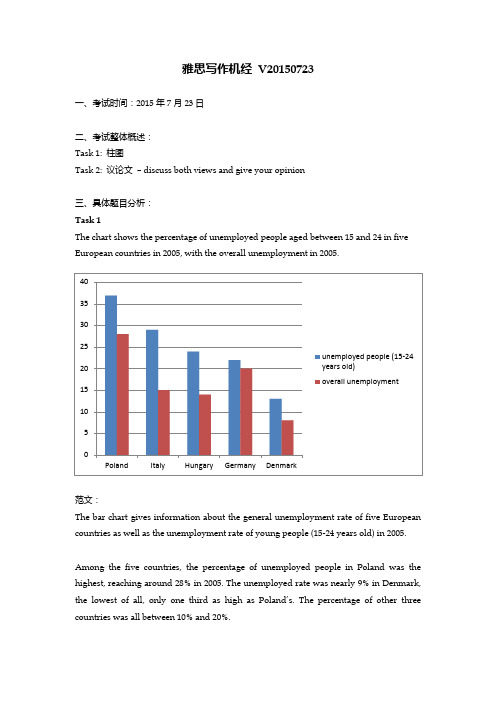
雅思写作机经V20150723一、考试时间:2015年7月23日二、考试整体概述:Task 1: 柱图Task 2: 议论文– discuss both views and give your opinion三、具体题目分析:Task 1The chart shows the percentage of unemployed people aged between 15 and 24 in five European countries in 2005, with the overall unemployment in 2005.范文:The bar chart gives information about the general unemployment rate of five European countries as well as the unemployment rate of young people (15-24 years old) in 2005.Among the five countries, the percentage of unemployed people in Poland was the highest, reaching around 28% in 2005. The unemployed rate was nearly 9% in Denmark, the lowest of all, only one third as high as Poland’s. The percentage o f other three countries was all between 10% and 20%.The layout was quite similar in the rate of young unemployed people. Poland’s figure was also the highest (more than 35%), followed by Italy (24%). Behind them, the percentage of young unemployment of Hungary and Germany ranged from 20% to 25%, with 22% and 24% respectively. Meanwhile, the rate was also quite small in Denmark, at just 13% in 2005.To sum up, among the five countries in 2005, Poland reached the highest rate while Denmark touched the lowest percentage in both overall unemployment rate and the young unemployment (15-24 years old) rate.备考建议:本次小作文考察的对象为静态柱图,在写作时可以将15到24岁的失业人数占比和总的失业率作为两类指标,进行五个国家间的对比。
20150627雅思写作A类考题回顾朗阁官方
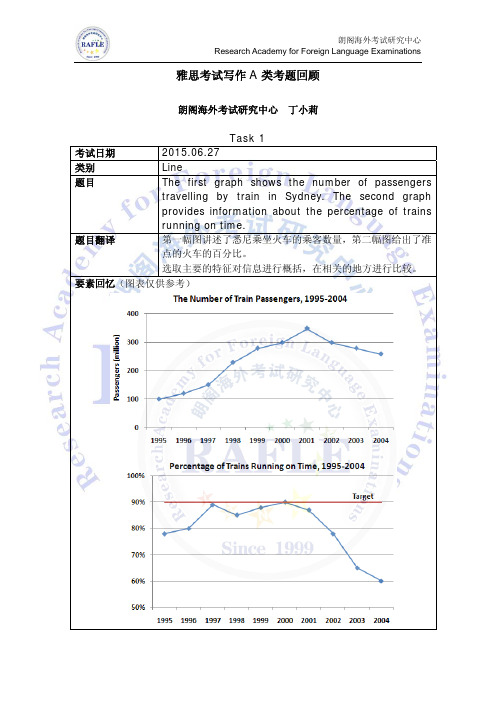
雅思考试写作A类考题回顾朗阁海外考试研究中心丁小莉Task 1考试日期2015.06.27类别Line题目The first graph shows the number of passengers travelling by train in Sydney. The second graphprovides information about the percentage of trainsrunning on time.题目翻译第一幅图讲述了悉尼乘坐火车的乘客数量,第二幅图给出了准点的火车的百分比。
选取主要的特征对信息进行概括,在相关的地方进行比较。
要素回忆(图表仅供参考)动态线图,两幅线图横向为时间的推移,从1995年到2004年,第一幅图纵向是乘坐火车的乘客数量,第二幅图纵向是准时的火车的百分比。
写作指导1)注意时态,要用过去时;2)可以先描写第一幅图乘客数量的上升趋势,着重于起点,极值以及终点。
3)再就第二幅图具体描述准时的火车的百分比波动及下降的趋势。
重点表达式The number of … stood at its smallest point at … in 1995.peak at, reach the peak atan inverse V-shaped growthfluctuate题目评价难度一般推荐练习剑桥真题7, Test 2剑桥真题8, Test 4近期考试趋势近三个月柱线表出现频繁,根据以往经验,接下来几次需注意柱图和流程图。
Task 2考试日期2015.06.27类别社会类题目Many people nowadays do not feel safe either whenthey are at home or go out. What are the reasons andwhat to do to solve this problem?题目翻译如今,很多人不管在家还是出门都觉得没有安全感,为什么?怎样解决这个问题?写作指导 注意时态,不要出现过去时(除非举过去的例子)推荐4段式写法:Opening: 引入Reasons analysis:1. 贫富差距拉大,犯罪率上升,人们对自身安全不放心;2. 即使在家上网,网络安全也存在隐患,个人信息可能会被泄露,造成损失,而人们也会丧失安全感;3. 媒体负面报道过多,夸大犯罪的普遍,人们忧虑社区不安全。
雅思口语考题回顾朗阁官方20150723

雅思考试口语考题回顾朗阁海外考试研究中心崔明媛考试日期: 2015年7月23日Part 1 考题总结考题总结:Study & Work1. Do you work or are you a student?2. What's your major? Have you ever communicated about your major with your friends?3. Will you study with others in the future? Why?4. What is your plan for your future study?5. When you study, do you feel happy?6. What’s your favorite subject? What do like most about it?7. Do you enjoy your school life? What are the benefits of being a student?8. What do you usually do after class?Hometown1. Where do you come from?2. Is there anything special about your hometown? Are there any beautiful places in your hometown?3. What is the weather like in your hometown?4. What are some of the changes that have taken place in our home town?5. What's your hometown famous for?6. What’s the traffic situation in your hometown?Vegetables and fruits1. What’s your favourite vegetable and fruit?2. How often do you eat fruits?3. Are there any special fruits in your hometown?4. Should we eat vegetables and fruits every day?Parks1. Does your hometown have many parks?2. Do you often visit public parks?3. What do you usually do there?4. Do you like parks?5. What kinds of parks do you like?6. What do you like most about a park?7. Did you go to parks when you were a child?8. What did you do there?9. Do you think it’s good to have parks and public gardens in cities?10. Do you think there should be more of them?11. Do you think you will go to parks more often in the future?Watching sky1. Do you like watching sky?2. Do you often take time to watch the sky?3. Do you like the sky during the day or night?4. Have you learned any courses about stars and planets?Collection1. Do you like collecting things?2. How much time do you spend on your collection?3. Would you keep your collection in the future?4. Why do people keep old things?5. What kinds of things do Chinese people like to collect?Mathematics1. When did you start learning math?2. Do you like math?3. Who taught you math?4. Who’d your favourite teacher so far?5. Is math difficult for you to learn?6. Do you like to use a calculator?Forgetting about things1. What do you remember to do every day?2. What helps people to remember things?3. Why do old people forget about things easily?4. Have you ever forgotten something important?Happiness1. What do you think of happiness?2. What do you like to do when you are happy?3. What kinds of things make you happy?4. What kinds of things do Chinese people feel happy about?5. Is it easy to be happy for you?Weather/ Season/Sunshine/Rain1. What weather do you like?2. Do you like hot or cold weather?3. Do you like sunshine?4. What harm can strong sunlight do to us?5. Do all people like sunshine?6. Would you like to travel when there is little sunshine?7. What do you often do during summer?8. What is the weather like in China?9. What are the differences among four seasons in China?10. What is the influence of weather on people?11. Does the weather ever affect what people do?12. Do you like rain?13. Do young people like rain?14. What do you do in rainy days?15. Did rain ever affect what you would like to do?Maps1. Do you use a map?2. When do you use a map?3. Who taught you how to use a map?4. How did you learn to use a map?5. Do you prefer to use electronic maps or those made of paper?Cars1. Do you like cars?2. Do you have a driver’s license?3. Have you ever driven a car?4. Do you have a car?5. Do you often drive it?6. Do you plan to buy a car in the future?7. If you wanted to buy a car, what kind of car would you choose?8. What kinds of cars are most popular in your country?9. Do you like travelling by car?Leisure Time1. What do you do in your spare time (free time)?2. In the evenings, do you prefer to relax at home and watch TV or go out with your friends?3. What do you usually do with your family?4. Do you think modern people like to do things with others, in a group?5. Are you good at organizing time? How do you usually organize time?6. Why do you think some people pay to learn time management? Do you think children should learn to manage time?7. Which part of the day do you like best?8. Which part of the day is beneficial for your study?9. How do the people in your country relax themselves?10. What do you usually do on weekends?Food and cooking1. What foods do you usually eat?2. Do you often eat in the restaurant? Do you like to eat outside?3. What food did you like to eat when you were a child? Do you stilllike that food now?4. If you had children, What food would you cook for your child in thefuture?5. Do you think it's good to take children to restaurants?6. Do you cook? If not, will you cook in the future?7. Who cooks in your family?8. What kind of meat do you like to eat? Do you like vegetables?9. Which do you prefer, eat more times a day and have little a time oreat less times a day but have more a time?10. What do you think of the whole family eating together?Part 2&3 考题总结考题总结:Describe someone you know who dresses well.You should say:who this person is;how you got to know this person;what he or she usually wears;and explain how you feel about the way he or she dresses.Describe a place where you like to go and relax (not your home).You should say:where it is;what it is like;how you spend time there;and explain why you feel relaxed there.Describe an age or a stage of life that was enjoyable/important to you.You should say:when it was;what you did during that period of life;who was with you;and explain why you think it was enjoyable to you.Describe a sportsperson you know does well.You should say:Who the person isHow you know this personWhat you do togetherAnd explain how you feel about this person.Describe a time you got up extremely early.You should say:when it was;what time you got up;how you felt when you got up;and explain why you got up early.Describe a situation when your friend didn’t tell you the whole truth.You should say:Who the friend wasWhat the situation wasWhy your friend did itAnd explain how you felt when you found out the whole truthPart 3What are the effects of lies?In what occasions do white lies happen?Does lying help people feel less embarrassed?Do you want an incomplete truth?Should husband and wife lie to each other?Describe an exciting sport you knowWhat the sport isHow you know about itWhether it is difficultAnd explain why you think it is excitingPart 3How do you think of extreme sports?Should governments ban dangerous sports for young people? Why or why not?What kind of sport do people in your country do?What’s the difference between professional athletes and amateur athletes?Describe a neighbor you ever helped.You should say:Who this person isWhen you helped this personHow you helped this personand explain why you helped this person.Part 3Do you think neighbors are important?Do you think it’s important to have a good relationship with one’s neighbors?Do you think people’s relationships with their neighbors today is the same as it was in the past?Would you say these are changes for the better or changes for the worse?Do you think people’s relationships with their neighbors are the same in the cities as they are in rural areas?Describe a person you know who speaks a foreign language well.You should say:who this person is;what foreign language he or she knows;how often he or she uses this language;and explain why you think this person can speak this language well. Part 3What benefit does it bring if you speak good English?Do you think it is easy for children to learn a foreign language?Do you think English will become the most popular language in the world?How do people learn a foreign language?Are there any changes in people’s way of learning a language?Describe a small successful company.You should say:what company it is;what it does;how you got to know about this company;and explain why you think this company is successful.Part 3Do you think online shopping will replace buying in stores?What are the qualities of successful companies?Do you want to work in a successful company?Describe a friend you had at school.You should say:What he / she looked likeWhere you first metHow you became friendsWhat you did togetherand explain how you feel about him or her.Part 3Do you think friends are important?What are the qualities of a good friend?Do you prefer to have one or two close friends or a wide circle of friends?Which do you think is better, to have a large group of friends or just a few close friends?How can one distinguish between a close friends and an acquaintance?In modern society, which do you think is more important, old friends or new friends?Is there any difference to the way you make friends now, compared to when you were a child?Describe an educational TV program you have watched.You should say:what the program is;what type of program it is;what contents it has;and explain what you’ve learnt from this program.Describe someone you know who has an interesting job.You should say:Who this person isHow you know this personWhat job they doand explain why you think this person’s job is interesting.Part 3In what ways do you think big and small companies are different? What types of companies prefer to hire university graduates?What do you think of the working conditions in your country today are better that in the past?Do you think long working hours can have an effect on the family lives of employees?What effects does working overtime have on the lives of employees, especially women?Do you think it’s reasonable that people have different salary levels? Is it very difficult for recent university graduates in your country to find a job?Describe an educational trip you went on when you were in school.You should say:when and where you went;who you went with;what you did;and explain what you learnt on this trip.Describe a time you had disagreement with a friend.You should say:when and where it happened;what you disagreed on;how you resolved the disagreement;and explain how you felt about the disagreement.Describe a paid job you ever did.what job it was;when and where you or this person did the job;how long the job lasted;and explain why you or this person chose to do this job.Describe something special that you saved money to buy.You should say:What it wasHow long it took you to save enough money to buy itWhy you wanted to buy this thingand explain how you felt when you bought it.Part 3How important is money in your life?Do you save money?Did you save when you were a child?How has the way people use their money changed in china in recent years?How can children be taught to manage money?Why do many people like to go shopping?What’s a popular law in your country?Describe a book /magazine/ that you enjoyed reading.You should say:What the book wasWhat was in this bookWhy you read itand explain what effect the book had on you.Part 3How often do you read?Do you have many books at home?Do Chinese people do enough reading?Do Chinese people like to read?What kind of people like reading and what kind of people don’t like reading very much?Do people with different reading levels all buy the same kinds of reading materials?What do Chinese people like to read?Describe a course you like now but didn’t like in the past.You should say:What it isWhen did you learn itHow long have you been studying itAnd explain why you didn’t like in the past but like it now.Describe a situation when you have to be friendly to someone you don’t like.You should say:Who the person isHow you know this personWhen and where the thing happenedAnd explain why you have to be friendly to the person.Describe a historic building that you visited.You should say:Where it wasWhat people do thereWhy you went thereand explain how you felt about this building.Part 3Why do people visit historical places?Do you think reading about a historical place has any advantages over actually visiting it?What types of historic places do people in your country most often visit?Do many people in your country visit historical buildings?Why do they visit these buildings?What do you think are the differences between actually visiting a historic place and reading about it in a book (or seeing pictures of it on the internet)?Do you think these historic buildings should be preserved?Who do you think should pay for these reparations?Do you think the government should pay for the maintenance and repair of historic buildings?Do you think the government should pay for this or should thevisitors pay for it?Which do you think is better, having the government own and pay for the maintenance of historic buildings or having private investors owning the buildings and paying for the maintenance?We should people learn about history?Do you think learning about history has any benefits for children?Describe a country you would like to visit at first.You should say:Where the country isWhat you know about this countryWhen you plan to visit this countryand explain why you would like to visit this country at first.Part 3When people go travelling (as tourists), what do they spend money on?When people move to another country, what changes do you think take place in their lives, compared to their lives before they left home?What do you think about children growing up abroad? Do you think children are affected by growing up abroad? How?What are benefits of travelling to new places?What are some of the best (or, most popular) travel destinations in China?Which places (countries) are Chinese people most interested in visiting?Describe a special meal that you would like to have./you would like to invite someone to eat.You should say:Who you would invited to eat with youWhere you would eatWhat you would eatand explain why you would like to have this special meal.Part 3Do people in your country often eat together with others?On what occasions do people eat a “special meal” in your country? What are the differences between an ordinary meal and meals for special occasions?Do you think people ate together as a family more in the past than they do now?Do you think modern lifestyles affect how often people eat together as a family?Would you agree that it’s important for the family to eat often朗阁海外考试研究中心Research Academy for Foreign Language Examinations together?Do you have any suggestions on how these problems could be solved?What do people in your country usually eat?Do young people usually eat the same types of food that older adults eat?Would you say there’s a greater choice of what to eat today, compared to the past?Do you think this trend will continue in the future?What do you think is more important, the quality or the price of food? What are the pros and cons of eating locally grown food, compared to food that comes from far away?What are the pros and cons of transporting food over long distances?Do you think it’s safe to transport food over long distances?雅思口语趋势分析和备考指导本场考试继续出现自五月换题以来的新题,且为高频话题,如建议、玩具、说外语的人、早起的经历等话题依然持续热门。
- 1、下载文档前请自行甄别文档内容的完整性,平台不提供额外的编辑、内容补充、找答案等附加服务。
- 2、"仅部分预览"的文档,不可在线预览部分如存在完整性等问题,可反馈申请退款(可完整预览的文档不适用该条件!)。
- 3、如文档侵犯您的权益,请联系客服反馈,我们会尽快为您处理(人工客服工作时间:9:00-18:30)。
雅思考试写作A类考题回顾
朗阁海外考试研究中心刘雅敏
Task 1
考试日期:2015.07.23
类别Bar
题目The following chart gives information about the unemployment rate of people aged between 15 and 24
and the overall unemployment rate of five European
countries in 2005.
题目翻译以下图表显示了2005年欧洲五个国家15岁至24岁之间的
公民的失业率,以及整体的失业率情况。
要素回忆(图片仅供参考)
写作指导1)注意时态的表达
2)注意比较:五个国家15-24岁公民之间失业率的比较;
15-24岁之间失业率与整体失业率的比较
3)注意极值的描写
重点表达式It is apparent from the chart/graph…
The unemployment rate of … stood at the largest
among five countries in 2005, which was twice that
of ….
题目评价难度较低
1:
关于男女出行里程数的静态柱状图;
Task
推荐练习 2014.11.08
剑4 Test 3 Task 1;
近期考试趋势8月份要重点关注柱状图、线图和饼图,次重点也可关注表格和流程图。
Task 2
考试日期:2015.07.23
类别社会类
题目Some people say government should give the health
care the first priority, while others believe there are
more important priorities to spend the tax payers'
money. Discuss both views and give your own opinion. 题目翻译一些人认为政府应该优先考虑医疗,但是其他人认为纳税人的
钱应该用在更重要的事情上。
讨论两方观点并给出你自己的观
点。
写作指导1)注意时态,一般情况下不要出现过去时
2)双边讨论题型(可中立,若选择中立偏一边倒,推荐倾向
更重要的事情):
1. 医疗:
a. 有助于减轻人们的经济负担,尤其是低收入阶层;
b. 政府的政策支持,可以避免药价过高;
2. 更重要的事情:
a. 教育:政府鼓励并投资教育,可以为更多学生提供受教育
的机会,进而提高整个国家的受教育水平;
b. 社会福利:比如为贫困家庭提供生活补贴;
c. 基础设施:为边远地区修建道路
重点表达form integral parts of our lives; amenities; medical
care; subsidize; have financially manageable access
to healthcare; issue favourable policies;
poverty-stricken; be under the poverty line; poverty
facilities
题目评价难度较低
政府是否应该投资医疗、教育事业
2:
推荐练习 2005.07.09
Task
近期考试趋势8月份的考试要重点关注教育类、科技类、媒体类话题。
